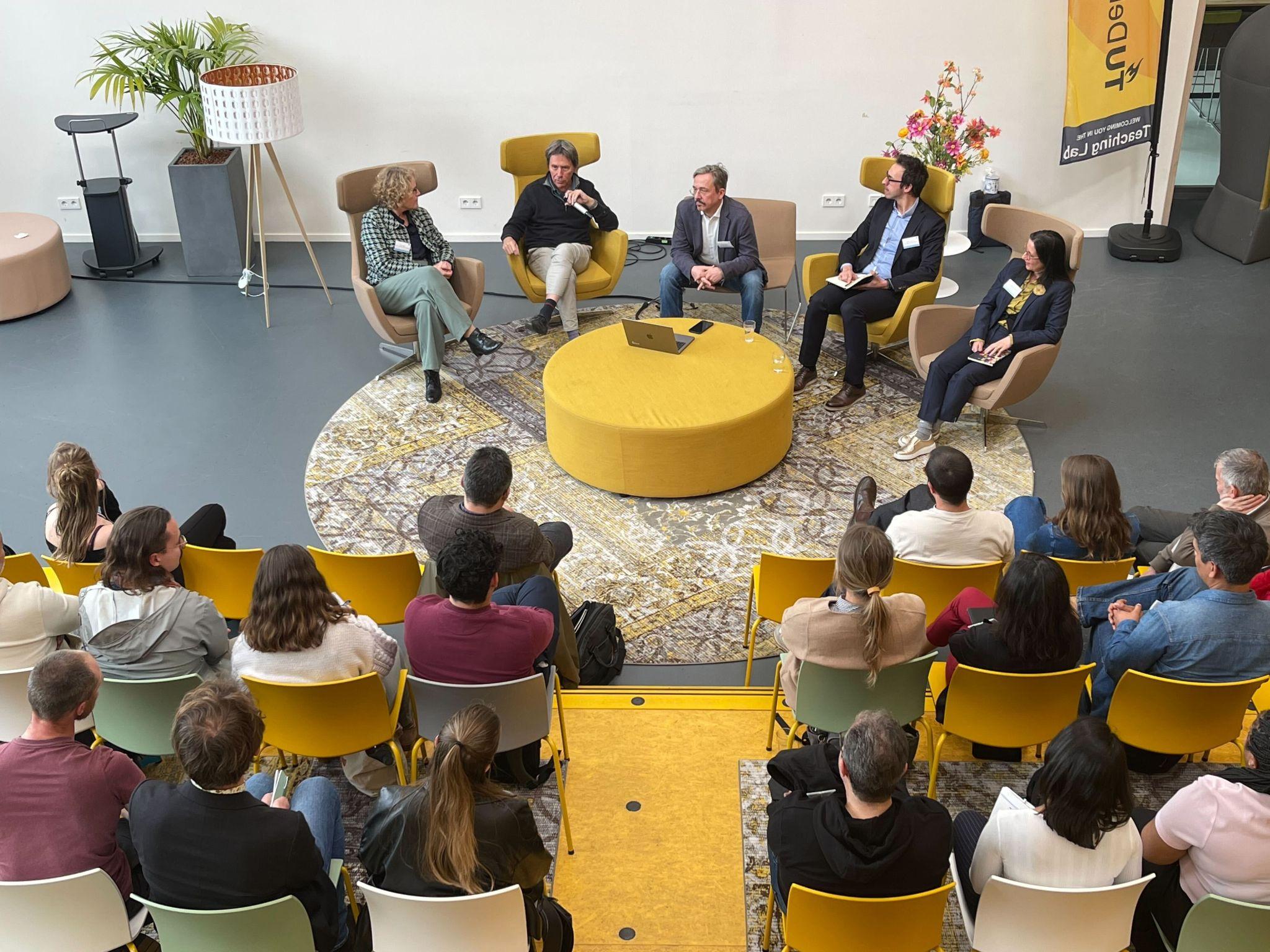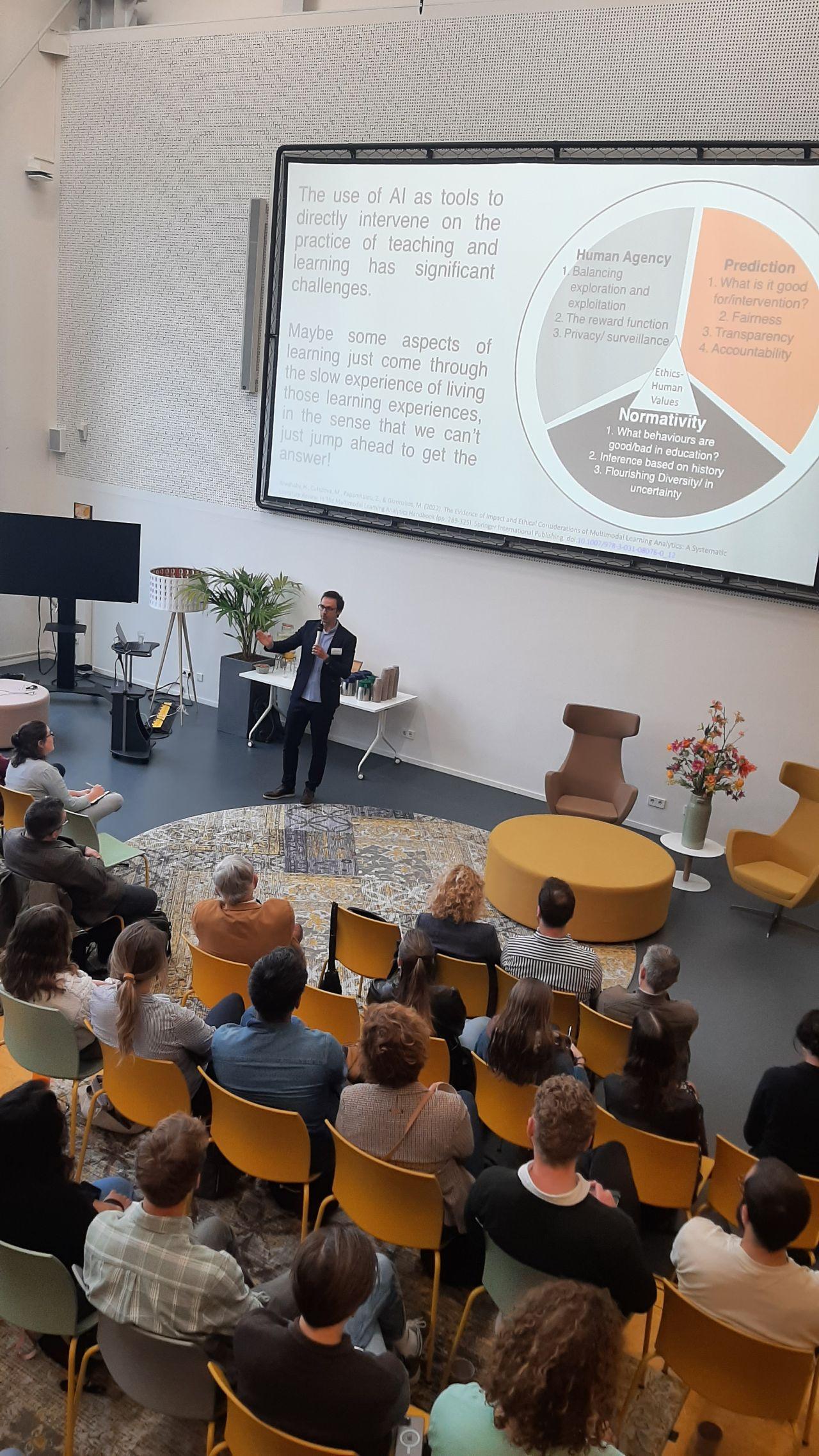
On the 18th of April 2024 the Leiden-Delft-Erasmus Centre for Education and Learning organised the 'Digital Education Research and Evidence' day. With over 100 participants, the programme of two international keynotes, seven workshops, and a panel on the future of research on digital education shaped a successful event with very positive and enthusiastic feedback from all participants.
The different perspectives and roles of AI in human learning and Human-Computer Collaboration were given in the first keynote by Prof. Mutlu Cukurova (UCL). In his talk he highlighted examples of how to use AI in educational settings and how future applications have the potential to change learning in personalised and collaborative settings.
 A first workshop round gathered participants and experts on three current topics of digital education and research: In the first workshop a multi-university team Manuel Valle-Torre (TUD) , Annouschka van Leeuwen (NPULS, University of Utrecht), Marcus Specht (LDE-CEL, TUD), and Esther Ventura-Medina (TU Eindhoven) presented the current discussion and landscape of applications and best practices in Learning Analytics. The current efforts of the 4TU Centre for Engineering Education and the NPULS project to develop high-scale Learning Analytics in the Dutch Higher Education system were showcased. Second, Erna Engelbrecht introduced her approach to evaluate educational innovation in a Higher Education Context and participants got to work with her evaluation framework. The third workshop discussed and introduced different approaches for inclusive programming and STEM education (Fenia Aivaloglou, Shirley de Wit, Julia Bolt, Anna van der Meulen).
A first workshop round gathered participants and experts on three current topics of digital education and research: In the first workshop a multi-university team Manuel Valle-Torre (TUD) , Annouschka van Leeuwen (NPULS, University of Utrecht), Marcus Specht (LDE-CEL, TUD), and Esther Ventura-Medina (TU Eindhoven) presented the current discussion and landscape of applications and best practices in Learning Analytics. The current efforts of the 4TU Centre for Engineering Education and the NPULS project to develop high-scale Learning Analytics in the Dutch Higher Education system were showcased. Second, Erna Engelbrecht introduced her approach to evaluate educational innovation in a Higher Education Context and participants got to work with her evaluation framework. The third workshop discussed and introduced different approaches for inclusive programming and STEM education (Fenia Aivaloglou, Shirley de Wit, Julia Bolt, Anna van der Meulen).
After a networking lunch break, Prof. Pierre Dillenbourg (EPFL) gave a perspective on 40 years of educational research and his reflection on classical randomised trial setups. He challenged current methods and pointed towards the future of educational research with more systemic approaches and holistic innovation by also taking into account the central role of the teacher when introducing educational innovations.
In the afternoon, two workshops highlighted the potential and current developments of XR technologies for higher education (Arno Freeke, Michel Beerens, Roland van Roijen, Marcus Specht) and on educational innovation by students taking responsibility driven by the Initiative on Innovation in Delft Engineering Education (Remon Rooij, Olga Ioannou, Sylvia Mooij, Silje Dehli, Caroline Wehrmann).
A final panel wrapped up this day full of discussions, interactions, reflections and lessons learned on digital educational research and educational innovation. In this panel the future role of research in the transformation of higher education has been discussed by Prof. Ena Voûte (TUD), Prof. Pierre Dillenbourg (EPFL), Prof. Esther Ventura-Medina (Tu/e), and Prof. Mutlu Cukurova (UCL). The moderator challenged the discussants on how to create impact and implement real evidence driven innovation in the Higher Education System and what the role of digital technologies can be in this trajectory.
The abstracts to all the keynotes and workshops as well as all the slides can be found on the website of the Leiden-Delft-Erasmus Centre for Education and Learning.
